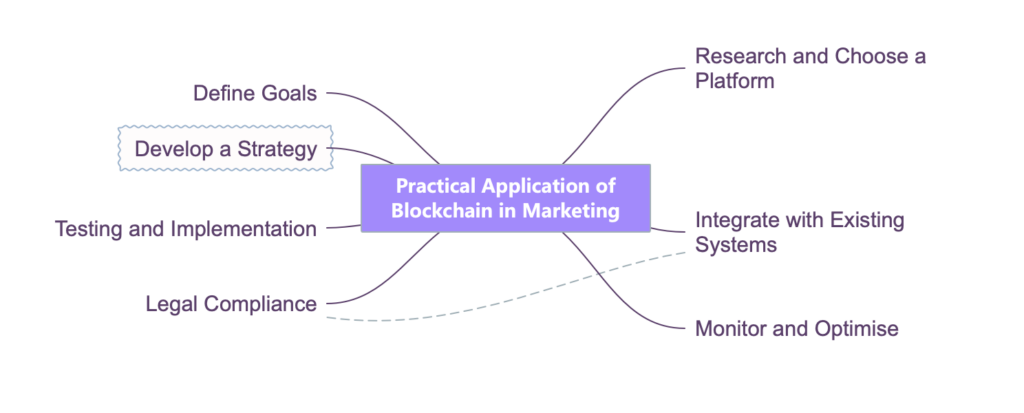Blockchain isn’t just a trendy tech term; it’s a revolution transforming many industries, including marketing. But how exactly is blockchain affecting marketing? And why should marketers, influencers, and entrepreneurs take notice?
Firstly, blockchain offers new ways to interact with customers and manage data. This increases transparency and trust between brands and their audiences and opens up new opportunities for personalised marketing strategies. Secondly, blockchain promises to make advertising campaigns more efficient by eliminating intermediaries and reducing costs.
But how exactly can blockchain be used in marketing? And what successful examples of its application already exist? We explore these questions in our article, presenting blockchain not as a complex technical concept but as a practical tool that can benefit marketers, influencers, and entrepreneurs.
In this article, we cover the basics of blockchain, examples of its successful application in marketing, and offer a step-by-step guide to implementing it into your marketing strategies. We aim to make the material accessible and understandable so that every reader can find something valuable and applicable.

The basics of blockchain and Its role in marketing
What is blockchain?
Blockchain is a unique technology chain of data linked together in blocks. Each block contains information about the previous block, creating a continuous, secure, immutable record. It can be considered a digital ledger, where every transaction and data exchange is safe and easily verifiable. With this structure, blockchain provides high security and transparency, making it ideal for use in many fields, including marketing.
Blockchain’s role in marketing
In marketing, blockchain offers new opportunities to create more transparent and efficient systems:
- Improved trust and transparency: Blockchain allows consumers to verify the authenticity and origin of products. This is especially valuable for brands looking to emphasise the quality and provenance of their products.
- Personalised marketing: Blockchain can help collect and analyse consumer data, enabling more accurate and targeted personalisation of advertising campaigns.
- Advertising campaign efficiency: Blockchain can reduce costs and increase the efficiency of advertising campaigns by eliminating intermediaries in advertising networks.
- Loyalty programmes: Blockchain provides innovative ways to create and manage loyalty programmes, making them more attractive to users.

Case Study: Successful examples of blockchain in marketing
In this section, we look at a few examples of companies that have successfully integrated blockchain into their marketing strategies, showing the variety of applications of the technology.
1. Brave and Basic Attention Token (BAT)
Brave is a web browser that uses blockchain to improve the interactivity and effectiveness of advertising. With its currency, the Basic Attention Token (BAT), Brave rewards users for viewing advertisements while protecting their privacy. This model offers a new approach to advertising where users control their data and are compensated for its use.

2. Babyghost and VeChain
Fashion brand Babyghost partnered with VeChain, a blockchain platform, to create a unique customer experience. They used blockchain to provide information about the provenance and authenticity of their products. Each garment has an embedded chip that, when scanned, tells the story of that product, reinforcing the brand’s connection with its customers.
3. BitClave
BitClave is a blockchain startup that focuses on advertising technology. They have developed a decentralised search engine where users are rewarded for accessing their data. This allows advertisers to interact directly with potential customers, increasing the effectiveness of advertising campaigns and reducing unnecessary costs.

4. Polymath
Polymath is a blockchain platform that simplifies issuing and managing security tokens. They help companies raise investments using blockchain technology, providing greater transparency and security for investors.

5. OrionCoin
OrionCoin uses blockchain to run its loyalty program. Customers can earn and redeem reward points on various platforms, which increases their value and attractiveness. This is an example of how blockchain can enhance traditional marketing tools, making them more convenient and profitable for customers.

Practical application of blockchain in marketing: Step-by-step guide
Applying blockchain to marketing may seem complicated, but it can be integrated into your strategy effectively with the right approach. Here’s a step-by-step guide to help you get started.
Step 1: Define goals
Before you start, defining what you want to achieve with blockchain is essential. This could be improving transparency, increasing the effectiveness of advertising campaigns, or creating an innovative loyalty programme. Your goals will determine which aspects of blockchain will be most beneficial to your business.
Step 2: Research and choose a platform
Research different blockchain platforms to find the one that best suits your needs. Choosing a platform that provides security, scalability, and ease of integration is essential.
Step 3: Develop a strategy
Develop a strategy that includes using blockchain to achieve your marketing goals. This could have plans for collecting and using data, managing advertising campaigns, or creating loyalty programmes.
Step 4: Integrate with existing systems
Evaluate how blockchain will integrate with your current marketing and analytics systems. This may require technical adaptations or the development of new interfaces.
Step 5: Testing and implementation
Start small by testing blockchain in specific areas of your marketing. This can be a pilot project or a limited experiment. Analyse the results and gradually expand your use of the technology.
Step 6: Monitor and optimise
Once implemented, monitoring and analysing the effectiveness of blockchain initiatives is essential. Use the data collected to optimise your strategies and improve your results.
Step 7: Legal compliance
Make sure your use of blockchain complies with all legal and data privacy regulations. This is especially important when dealing with user data.

Final thoughts
Blockchain offers many opportunities for marketers, influencers, and entrepreneurs. It improves transparency and trust between brands and their audiences and opens new horizons for innovative marketing strategies. From personalising advertising campaigns to developing unique loyalty programmes, blockchain provides tools to improve many aspects of marketing.
Now that you understand the opportunities blockchain can open up for your business, it’s time to take action:
- Start with learning: Expand your knowledge of blockchain and its marketing application. This will help you better understand the potential opportunities and risks.
- Explore your opportunities: Evaluate how blockchain can be integrated into your marketing strategy. Think about ways to use this technology to improve your products or services.
- Plan and experiment: Develop a plan to implement blockchain and start with small experiments. This will give you a better understanding of the technology and its impact on your business.
- Adapt and innovate: Be prepared to adapt and innovate. Blockchain is dynamic; success in this area requires flexibility and a willingness to learn constantly.
